- Home
- Michael Swanwick
The New Prometheus: A Tor.com Original
The New Prometheus: A Tor.com Original Read online
Begin Reading
Table of Contents
About the Author
Copyright Page
Thank you for buying this
Tom Doherty Associates ebook.
To receive special offers, bonus content,
and info on new releases and other great reads,
sign up for our newsletters.
Or visit us online at
us.macmillan.com/newslettersignup
For email updates on the author, click here.
The author and publisher have provided this e-book to you without Digital Rights Management software (DRM) applied so that you can enjoy reading it on your personal devices. This e-book is for your personal use only. You may not print or post this e-book, or make this e-book publicly available in any way. You may not copy, reproduce, or upload this e-book, other than to read it on one of your personal devices.
Copyright infringement is against the law. If you believe the copy of this e-book you are reading infringes on the author’s copyright, please notify the publisher at: us.macmillanusa.com/piracy.
The Arctic wastes stretched wide in every direction, vast and irregular plains of ice which seemed to have no end. At their center, barely visible in the weak light provided by a sliver of sun at the horizon, was a rapidly moving sled. It was pulled by eight dogs with a single wolf at their lead, and ridden by a large man bundled in Sami furs.
Ritter welcomed the cold and hardship as an opportunity to test his manhood against Nature at its harshest. The scarf wrapped about his lower face was stiff with ice frozen from the moisture of his exhalations and what little of his skin was exposed to the air felt numb. When he bit off a mitten and pressed a hand over his eyebrows, the flesh beneath was warmed to life again and began to sting. The air was still and that, he had to admit, was good for it allowed Freki to follow the scent of their prey with ease.
He had pursued the half-man from Europe and was prepared to pursue him to the Pole if necessary. He was sure it would not be, however, for the traces of the homunculus’s passage had not been erased from the snows. Ritter was close on his trail.
A nub appeared on the horizon.
Ritter drew up the sled and, taking out a pair of binoculars superior to anything he could have imagined a year ago, studied the anomaly. Under magnification, it revealed itself to be a canvas tent that had been insulated by stacking up blocks of snow on all sides and piling more loose snow over its top.
Methodically, Ritter disentangled the sled dogs from the harness. Then he gave them a mental push to trot back a mile or so the way they had come and wait for him. If he died, his hold over the dogs would cease and then they must do their best to survive on their own. Ritter was not sure that they could. But at least they would have a chance.
He heaped snow over the sled, so that it looked like any other unimportant lump of landscape, then lay down behind it where he could not be seen. He was far from convinced such precautions were necessary. But he had underestimated the creature’s abilities in Helsinki and would not do so again.
Then he sent Freki ahead to serve as his ambassador.
The wolf loped across the snow and, upon reaching the tent, scrabbled at the canvas door. Then, when hands from within pushed it open, he rolled over on his back, exposing his stomach.
The homunculus looked down on the wolf and smiled. Kneeling, he stroked the animal’s underside and scratched it behind one ear. So far as Ritter could tell, he did not project his consciousness into Freki’s mind for even an instant. Nevertheless, the creature said aloud, “You are a diplomatic fellow, whoever you are. Come and talk to me. I promise no harm will come to you.”
Ritter stood, brushing off snow, and began the long trudge toward the tent.
* * *
“The safest thing would be to kill him on sight,” Sir Toby had said. He and Ritter were in his London office, a walnut-paneled room frowsty with cigar smoke and casual treachery.
“I am no assassin. If murder is your intent, send a professional.”
“So I did, three of them. This is no ordinary man. Indeed, by most accounts, he is hardly a man at all.”
In Ritter’s experience, when his superior emphasized the inhuman nature of an opponent, whether physical, mental, or moral, he intended actions such as no decent man would visit on a fellow member of human society. Scowling, he said, “How do you mean?”
“He is a homunculus—an artificial man. There were reports—as reliable as such things can ever be—that the Mongolian Wizard had created a being with powers exceeding even his own. You will read them on your way to Helsinki. He is reputedly of great stature, inhumanly strong, and capable of wielding every known form of magic. For reasons yet unknown, this prodigy broke free of his creator and fled westward. There were several desperate attempts to recapture him. That caught our interest. Then his pursuers simply turned around and went home. Which by itself convinced me that such a being is too dangerous to be allowed loose in the world. While on the run, he somehow managed to acquire a great deal of wealth. Currently, he is using it to provision a ship. A schooner awaits you at the docks. If you leave immediately, you can intercept him before he departs for wherever he is bound.” Sir Toby fell silent. After a long pause, he said irritably, “Why are you still here?”
“I’m not sure I understand what you expect of me.”
“Use your own judgment. You have a certain … flexibility in these matters.”
Ritter had never before been accused of flexibility. He decided to receive the declaration as praise. Nevertheless, he said, “If I must kill him, I will. However, I require full autonomy in this affair. It is entirely possible I will end up letting this fellow remain alive and at large.”
Sir Toby sighed. “So be it.”
* * *
“I am prepared to offer you asylum,” Ritter said, “in exchange for what you know about the Mongolian Wizard. You will be given a modest stipend for as long as you need it, an apartment of your own, assistance in finding work, a new identity. By this time next year, you will be a citizen of London like any other.”
The homunculus laughed. “A grotesque like me?”
“You are a little tall, perhaps. But not beyond the range of human possibility.”
“It was you who shot at me at the docks, wasn’t it?”
“I had no choice. You rebuffed my invitation to parlay and the ship was pulling out.” Watching the man’s eyes and seeing in them no trace of intemperance, Ritter decided to take a chance. “I hit you too. You grimaced, clutched your chest, and bent over. I am certain that I saw blood. But when you straightened again, it was gone.”
“You hit my heart, yes. Any other man would have died then and there. But I did not. Would you like me to tell you why?”
“It is my most fervent hope that you will.”
“I was born by immaculate conception.” The homunculus was a handsome fellow, though his extreme height—he was a good eight feet tall—rendered even that alarming. He had given Ritter a barrel of salt pork for a chair and himself sat cross-legged on his sleeping pallet, putting their eyes on the same level. “Do you know how that works?”
“I am afraid that I do not.”
“It is a gruesome process. First the skeleton is assembled from the living bones of various animals. Human bones would not do, for it was desired to give me the features and physiognomy of a god. Bones taken from dead creatures would be … dead. So animals were required to suffer. It took a phalanx of surgical wizards just to keep the skeleton viable while muscles and cartilage were attached, nerves grown to interlace the flesh, organs coaxed into interaction, skin convinced to cover all … More magical talent
s were employed in my creation than for any other single purpose in human history. It is doubtful that anyone but my father—for so I consider him—could have arranged for such a thing. And even he had to effectively bring the war to a standstill to free up the resources necessary for it.”
“I’m sorry—which war was this?”
“The current one. Difficult though this may be for you to believe, I was created barely six months ago.” The homunculus proceeded to tell his tale.
* * *
My earliest memories are of combat. Day after day, I was drilled to exhaustion in all the martial arts. My father I never saw. His place was taken by a weapons master, a pompous but capable Austrian named Netzke who taught me to fight with dagger, sword, pistol, rifle, and singlestick. Specialists were brought in to train me in fisticuffs and various other forms of bare-handed combat. Herr Waffenmeister Netzke worked me hard. At the time, I had the understanding of a child for I was mere weeks old, and it did not occur to me that I had any choice but to obey him.
At night, as I was falling asleep, I heard voices. At first, they were a soft murmuring, as of a not very distant sea. But day by day they grew louder and more insistent, as if they were saying something I needed to know but could not understand.
When I asked Netzke about the sounds and what they meant, instead of raising his fist to strike me as I’d more than half expected, he looked thoughtful. “They mean we must accelerate your training,” he said, and the very next day he brought in a wizard to tutor me in pyrokinetics—a much more likable fellow than Netzke by far, the Margrave von und zu Venusberg.
* * *
A harsh cry involuntarily escaped Ritter’s lips.
“I’m sorry, is the margrave someone you knew?”
“He is my uncle. A most excellent man and one who disappeared when Bavaria was overrun. I can scarce believe he would betray his own country. I … No, pray continue. Forgive me for interrupting.”
The homunculus placed a hand on Ritter’s shoulder. “He would not have had any say in the matter. The Mongolian Wizard has ways of converting talented people to his cause. But allow me to return to my story and, though it is not a happy one, perhaps you will find some small measure of comfort in it.”
* * *
It was the margrave who convinced Netzke that I was being overworked. “You are like the swordsmith who heats his creation red hot,” he said, “and then quenches it in oil, only to return it to the furnace again, back and forth, over and over, until the metal is so brittle it will break with the first blow struck in battle. Your charge has a brain—he must learn to use it as well as his brawn.”
Hearing the logic of those words, Netzke agreed, though reluctantly. So the margrave set out to teach me how to read. After the first hour of his ministrations, I grew impatient. “Explain to me the principles of this skill,” I demanded. And when he had done so, I astonished him by picking up the text he was using as an exemplar, Caesar’s Commentaries on the Gallic War, and reading the first several pages aloud.
Thus, I gained access to my father’s library.
I was in Heaven. In short order, I read Milton’s Paradise Lost, Plutarch’s Lives, and, most sublime of all, The Sorrows of Young Werther. From there, I went on to Rousseau and Kant and Locke and Descartes and Spinoza and Hobbes and, oh, so many more! I entered the library little more than an animal. Reading books made me human.
Perhaps it was coincidence, perhaps not. That evening something broke open within me. I realized that the sounds I heard were words, though neither spoken nor written. I was eavesdropping on the private thoughts of those around me: their fears, greeds, lusts, hatreds … It was not a pleasant experience. Much of this, I have since learned, came from my being in a nexus of worldly power, which necessarily drew to it, like flies to rotting meat, the worst exemplars of humankind. But even in the best of men there are dark thoughts and unwelcome fantasies. Had I lived in a monastery, the minds of the holy brothers would have been a torment to endure. And, having mastered literacy, my weapons training began anew. Only now, understanding—or so I thought—their intent, the exercises were repugnant to me.
At such a miserable time, your uncle was a godsend. In me, I think, he saw the mirror of his own unhappiness. We both despised our situations yet could see no way free of them. Young though I was, he spoke to me as if I were his equal, freely sharing his doubts and regrets. He was, as I am sure you know, a good man. From him I learned that to be human was not necessarily to be evil.
“Sir?” I asked him once. “Why is the world in books so much better than the world in life?”
After a long, thoughtful silence, the margrave replied, “People often relate arguments they have had and claim to have said things they only thought of later. Novels are life lived as it should have been and factual works such as essays and history are thought laid out without the false starts, blind alleys, and easy assumptions we experience in the event. That’s all.”
“I intend to think clearly the first time, and to live life without making mistakes.”
It was a callow thing to say, but the margrave only replied, “Well, perhaps you will be the first man to manage that trick. In any event, I encourage you to try.”
The margrave also taught me the rudiments of projecting fire with one’s thought, a skill I have since expanded far beyond anything he could ever have envisaged. As with reading, this skill opened new worlds to me. All forms of magic are but expressions of a single talent—I see you nodding, as if you had already suspected as much—limited only by the mental capacity of its possessor. Most people can wield this talent not at all. An elite class can, with training, master a single skill toward which they have a predisposition. And scattered here and there are a handful of extraordinary individuals who can master two or even three skills without being destroyed by them.
There are many such skills. In short order, I became the master of them all.
Word of my accomplishments spread swiftly through the court. We were housed in an ancient castle near the Russian border—by your expression, you know which one—whose windows had been bricked up and courtyards covered over to prevent men like yourself sending goshawks or the like to eavesdrop upon us. Though I more than once fancied I heard faint thoughts emanating from behind the wainscoting, which suggested you had spies diminutive enough to ride mice through small openings in the masonry. Be that as it may, the castle was a dark place.
So it was in a gloomy chamber insufficiently lit by whale-oil lamps that Netzke showed me off before a crowd of high-ranking officials. “This is our big day, eh?” he said, rubbing his hands together. Then he ran me through my paces. I bent iron at a distance, levitated, ran a dagger through my hand and then closed and healed the resulting wound, and made a dead rabbit hop and then, rising up on two legs, dance a gavotte. Finally, for the climax, Netzke commanded me to destroy a dummy tied to a cross at the far side of the room. Nothing could have been simpler. With a thought, I turned it to ashes—and burnt off the eyebrows of those who stood too close to the dummy, to boot.
The crowd broke into spontaneous applause. They were all smiles.
But I could read their dark, ambitious thoughts.
The Mongolian Wizard—even in his own court, he had no other name—was away on business of the Empire. But now Netzke announced that, my education being complete, he would be sent for and that within a fortnight, I would meet my father at last.
More applause.
I told you that animals had to be cruelly abused to create my frame. Only one animal could donate the materials that make up my four-lobed brain—the human animal. I had known this fact from very early on. My readings then made me aware of how vile a deed this was and, as a result, I was profoundly ashamed of my origins. Nevertheless, having more to think with than other mortals, and it more efficiently structured, I could perform prodigies of reasoning unknown to lesser men. All in a flash, I realized that my father had not had me created as a weapon, as I had previously assumed, but as
a host for his identity. Using his own uncanny powers, he would oust me from my brain and assume my body as an ordinary man might don a new coat. The first such, moreover, of many he would assume in a lifetime that might well last a thousand years.
I stood transfixed with horror.
It was the worst of all possible times for Netzke to nudge me in the ribs and say, “You will sit at the right hand of your father—and then you will remember old friends, eh? What will you do for them then, eh? Eh?”
The evil burning within him was like a flame—dazzling. I had the power to reach out and turn it down low. May God forgive me, I did not. Instead, I said, “I will do this,” and quenched that flame entirely.
He fell to the ground, dead.
Everybody present—and they were among the most powerful men and women in the Empire—saw me do this. When I stalked off to my quarters to brood, not a one of them tried to stop me.
That night, the voices crashed in on me with unprecedented clarity—and all of them were focused exclusively upon me. Some courtiers simply feared my power. Others hoped to corrupt and then blackmail me or by elaborate lies to make me their ally and dupe. To kill me and place the blame on a rival. To convince another to kill me and afterward denounce him. To encourage my ambitions and become my most loyal and trusted lickspittle. In all the castle, there was but one soul whose thoughts were not violent and vicious. Half-maddened by this mental cacophony, and by the guilt I felt for the thoughtless and casual murder of the weapons master, I rose from my bed and dressed.
Then I went to the margrave’s room and knocked upon his door.
As I already knew from his thoughts, he was still awake. The margrave had been sitting with a glass of whiskey, thinking solemnly about suicide. On seeing me, he set aside the glass and said, “A moment ago, dear friend, I was thinking that there remained not one kindly face in all the world—and now, in an act of Providence, you appear to prove me wrong.”

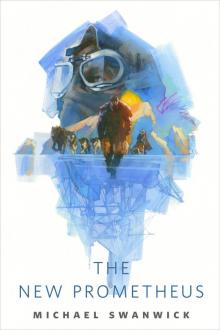 The New Prometheus
The New Prometheus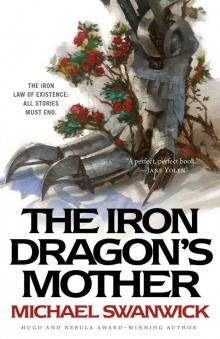 The Iron Dragon’s Mother
The Iron Dragon’s Mother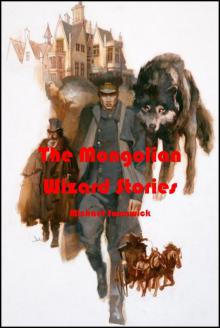 The Mongolian Wizard Stories
The Mongolian Wizard Stories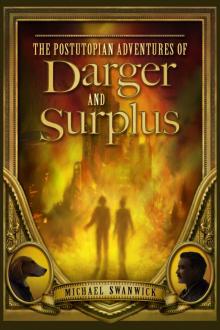 The Postutopian Adventures of Darger and Surplus
The Postutopian Adventures of Darger and Surplus Day of the Kraken
Day of the Kraken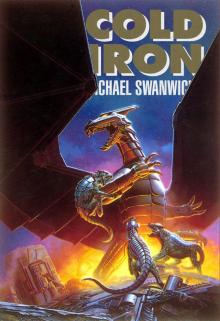 Cold Iron
Cold Iron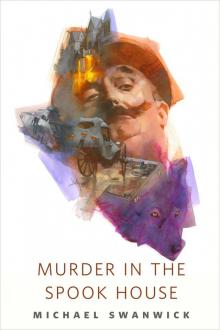 Murder in the Spook House: A Tor.com Original
Murder in the Spook House: A Tor.com Original Radio Waves
Radio Waves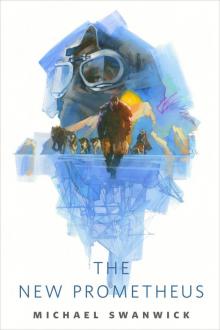 The New Prometheus: A Tor.com Original
The New Prometheus: A Tor.com Original Stations of the Tide
Stations of the Tide Vacuum Flowers
Vacuum Flowers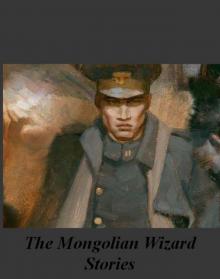 The Mongolian Wizard Stories (online stories 1-7)
The Mongolian Wizard Stories (online stories 1-7)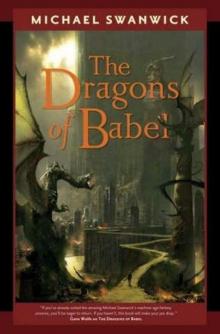 The Dragons of Babel
The Dragons of Babel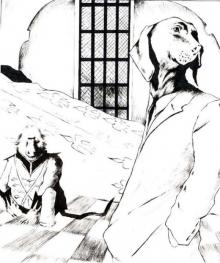 The Dog Said Bow-Wow
The Dog Said Bow-Wow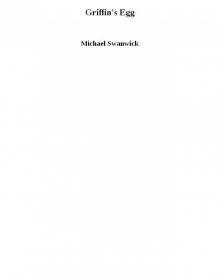 Griffin's Egg
Griffin's Egg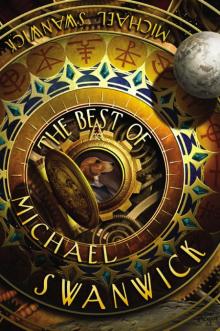 The Best of Michael Swanwick
The Best of Michael Swanwick Not So Much, Said the Cat
Not So Much, Said the Cat In the Drift
In the Drift Vacumn Flowers
Vacumn Flowers Slow Life
Slow Life The Wisdom Of Old Earth
The Wisdom Of Old Earth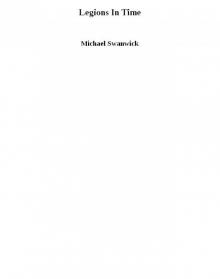 Legions In Time
Legions In Time Scherzo with Tyrannosaur
Scherzo with Tyrannosaur The Year's Best Science Fiction (2008 Edition)
The Year's Best Science Fiction (2008 Edition)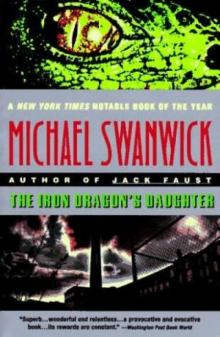 The Iron Dragon's Daughter
The Iron Dragon's Daughter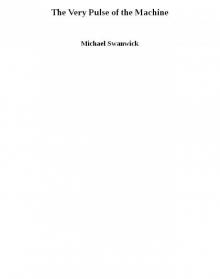 The Very Pulse of the Machine
The Very Pulse of the Machine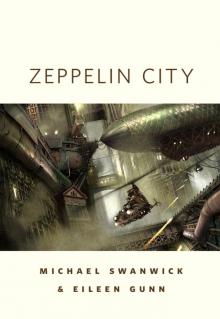 Zeppelin City
Zeppelin City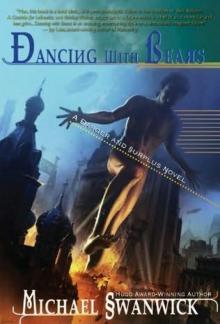 Dancing with Bears
Dancing with Bears Bones of the Earth
Bones of the Earth Tales of Old Earth
Tales of Old Earth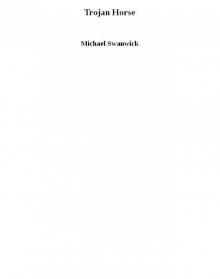 Trojan Horse
Trojan Horse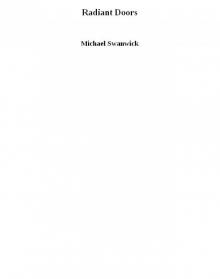 Radiant Doors
Radiant Doors